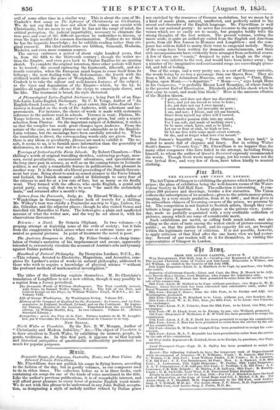Dramatic Songs, for Soprano, Contralto, Tenor, and Bass Voices. By Edward Francis Fitzwilliam.
Mr. Fitzwilliam does not publish his songs in flying leaves, according to the fashion of the day, but in goodly volumes, as our composers used to do in olden times. The collection before us is in three books, each containing six songs for one of the kinds of voice mentioned in the title. Like the author's previous publications, it is of remarkable interest, and will afford great pleasure to every lover of genuine English vocal music. We do not wish this phrase to be understood in any John Bullish acceptation, as designating a style of melody neither refined by Italian grace
nor enriched by the resources of German modulation, but we mean by it a kind of music plain, natural, unaffected, and perfectly suited to the accent and character of the English language. Mr. Fitzwilliam is well read in our national poetry : he never has recourse to the namby-pamby verses which are so easily set to music, but grapples boldly with the strong thoughts of the best writers. The present volume, setting the music aside, is quite an anthology culled from the English and American poets, from old Ben Jenson to "lemma and Longfellow ; and the composer has seldom failed to marry their verse to congenial melody. Many of the songs have been written for dramatic entertainments, and their rich accompaniments have evidently been arranged from orchestral scores. A few of them are " comic," designed to raise a laugh on the stage: they are very inferior to the rest, and would have been better away ; but a number of the imaginative and sentimental songs are exceedingly graceful, and full of feeling.
One of the songs, and a very pretty one, is a sort of literary curiosity, the words being by no less a personage than our Queen Bess. They are from a MS. in the A.shmolean Museum, and are signed, "Finis, Min. Regina. upon Moun—'s departure." " Moun—," says Leigh Hunt in his Companion, "is probably Blount Lord Mountjoy, of whose family is the present Earl of Blessington. Elizabeth pinched his cheek when he first came to court, and made him blush." Here is the amorous effusion of the Maiden Queen.
"I grieve, and dare not show my discontent;
I love, and yet am forced to seem to hate; I do, yet dare not say I ever meant; I seem stark mute, yet inwardly do prate ; I am, and not; I freeze, and yet am burned, Since from myself my other self I turned. Some gentler passion slide into my mind, For I am soft, and made of melting snow ; Or be more cruel, Love, and so be kind ; Let me or float or sink, be high or low, Or let me live with some more sweet content, Or die, and so forget what love e'er meant."
Ben Jonson's beautiful song, "Prom Oberon, in faerye land," is united to music full of elegance and fancy. But in setting Walter Scott's famous "County Guy," Mr. Fitzwilliam is no happier than the many other composers who have failed in the attempt, including Bishop himself, to whom the author of Quentin Durward expressly recommended the words. Though Scott wrote many songs, yet his verses have not the true lyrical flow, and very few of them_ have taken kindly to musical clothing.
























 Previous page
Previous page